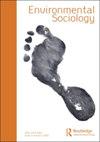台湾社会对自然灾害的准备行为及其与经验、认知和社会参与的关系
IF 2.8
Q3 ENVIRONMENTAL STUDIES
引用次数: 3
摘要
摘要本研究考察了个人过去对自然灾害的经历和看法,以及他们对志愿组织的参与,与他们的灾害防备之间的关系。该研究首先探讨了个人过去经历过三种类型的自然灾害(洪水、山体滑坡和地震),以及他们对灾害风险和可控性的看法,与他们参与志愿组织(社会资本的重要指标)的关系。这项研究还调查了个人对自然灾害的经历和认知,以及他们对志愿组织的参与,与他们对未来灾害的准备行为之间的关系。这项研究的结果表明,过去经历过自然灾害的居民通常报告了更好的准备行为,尽管结果因自然灾害类型而异。感知风险和感知可控性都与准备行为呈正相关,但感知可控性与参与志愿组织的关系更为密切。本文章由计算机程序翻译,如有差异,请以英文原文为准。
Preparedness behaviors for natural hazards and their association with experiences, perceptions, and social engagement in Taiwanese society
ABSTRACT This study examined how individuals’ past experiences and perceptions of natural hazards, as well as their participation in voluntary organizations, were associated with their hazard preparedness. The study first explored how individuals’ past experiences of three types of natural hazards (floods, landslides, and earthquakes), and their perceptions of hazard risk and controllability, were associated with their participation in voluntary organizations – an important indicator of social capital. This study also investigated how individuals’ experiences and perceptions of natural hazards, and their participation in voluntary organizations, were associated with their adoption of preparedness behaviors for future hazards. The results of this study indicated that residents who experienced a natural hazard in the past generally reported better preparedness behaviors although the results differed according to the type of natural hazard. Both perceived risk and perceived controllability were positively associated with preparedness behavior, but perceived controllability was more strongly associated with participation in voluntary organizations.
求助全文
通过发布文献求助,成功后即可免费获取论文全文。
去求助
来源期刊

Environmental Sociology
ENVIRONMENTAL STUDIES-
CiteScore
4.60
自引率
12.00%
发文量
34
期刊介绍:
Environmental Sociology is dedicated to applying and advancing the sociological imagination in relation to a wide variety of environmental challenges, controversies and issues, at every level from the global to local, from ‘world culture’ to diverse local perspectives. As an international, peer-reviewed scholarly journal, Environmental Sociology aims to stretch the conceptual and theoretical boundaries of both environmental and mainstream sociology, to highlight the relevance of sociological research for environmental policy and management, to disseminate the results of sociological research, and to engage in productive dialogue and debate with other disciplines in the social, natural and ecological sciences. Contributions may utilize a variety of theoretical orientations including, but not restricted to: critical theory, cultural sociology, ecofeminism, ecological modernization, environmental justice, organizational sociology, political ecology, political economy, post-colonial studies, risk theory, social psychology, science and technology studies, globalization, world-systems analysis, and so on. Cross- and transdisciplinary contributions are welcome where they demonstrate a novel attempt to understand social-ecological relationships in a manner that engages with the core concerns of sociology in social relationships, institutions, practices and processes. All methodological approaches in the environmental social sciences – qualitative, quantitative, integrative, spatial, policy analysis, etc. – are welcomed. Environmental Sociology welcomes high-quality submissions from scholars around the world.
 求助内容:
求助内容: 应助结果提醒方式:
应助结果提醒方式:


